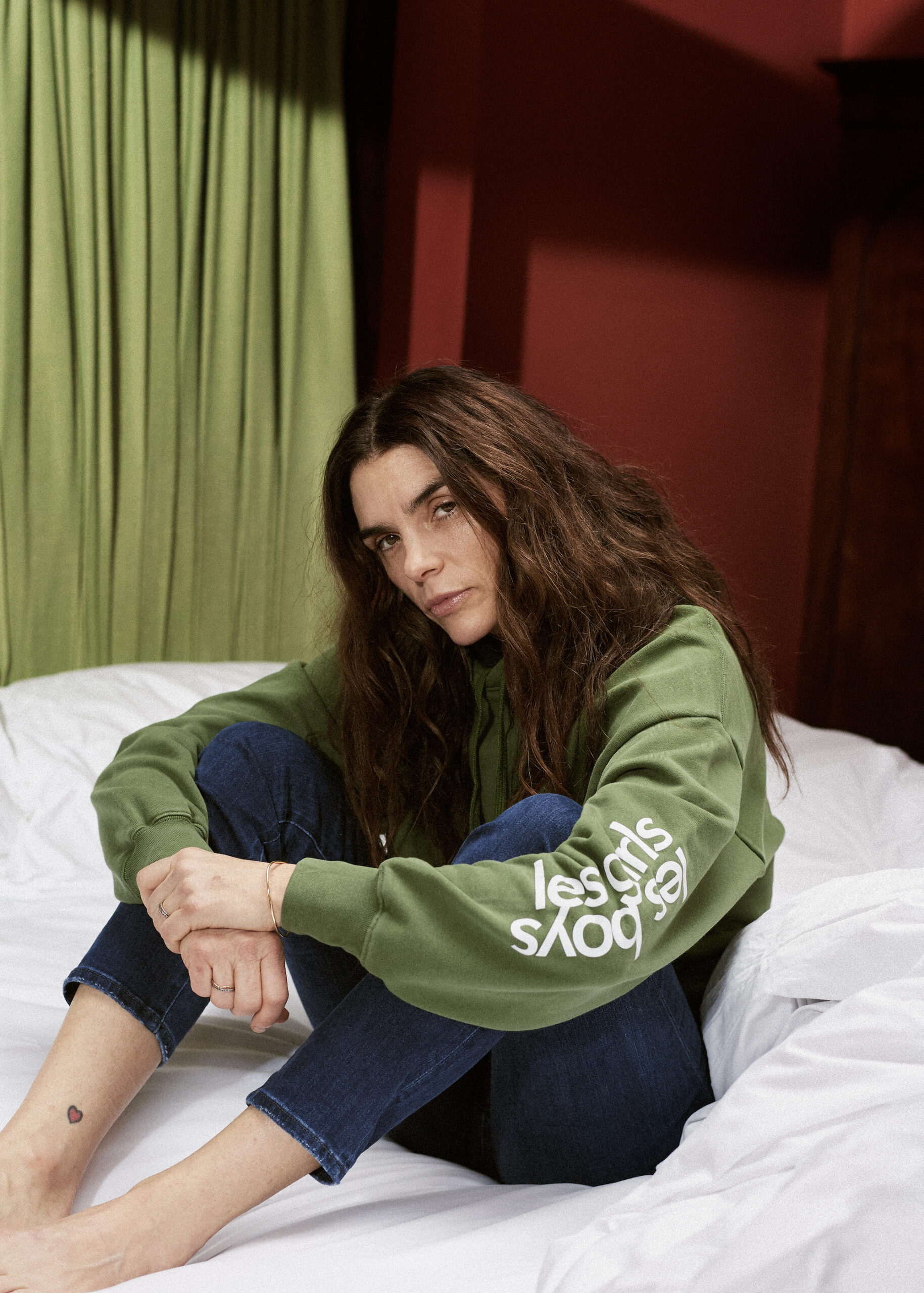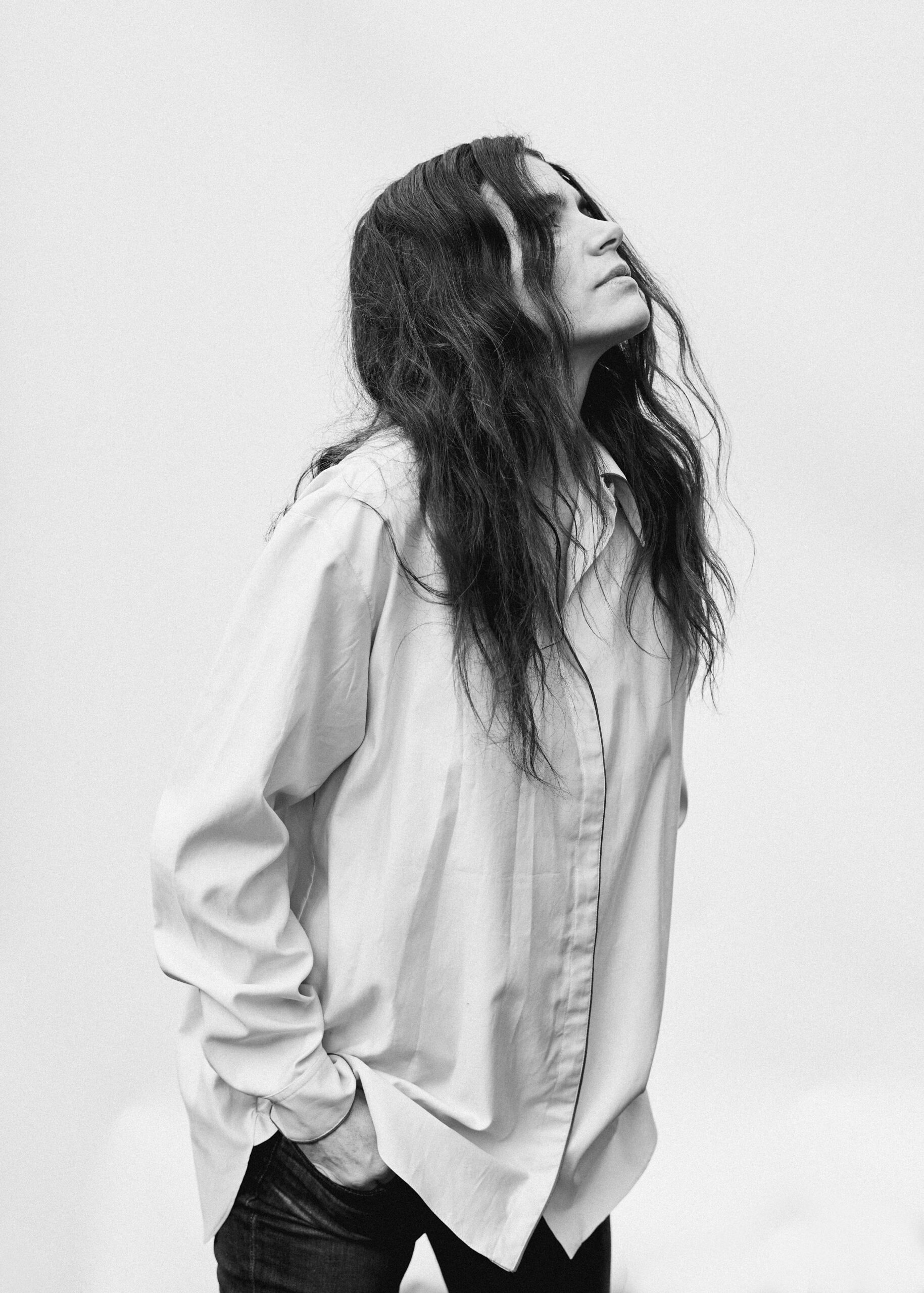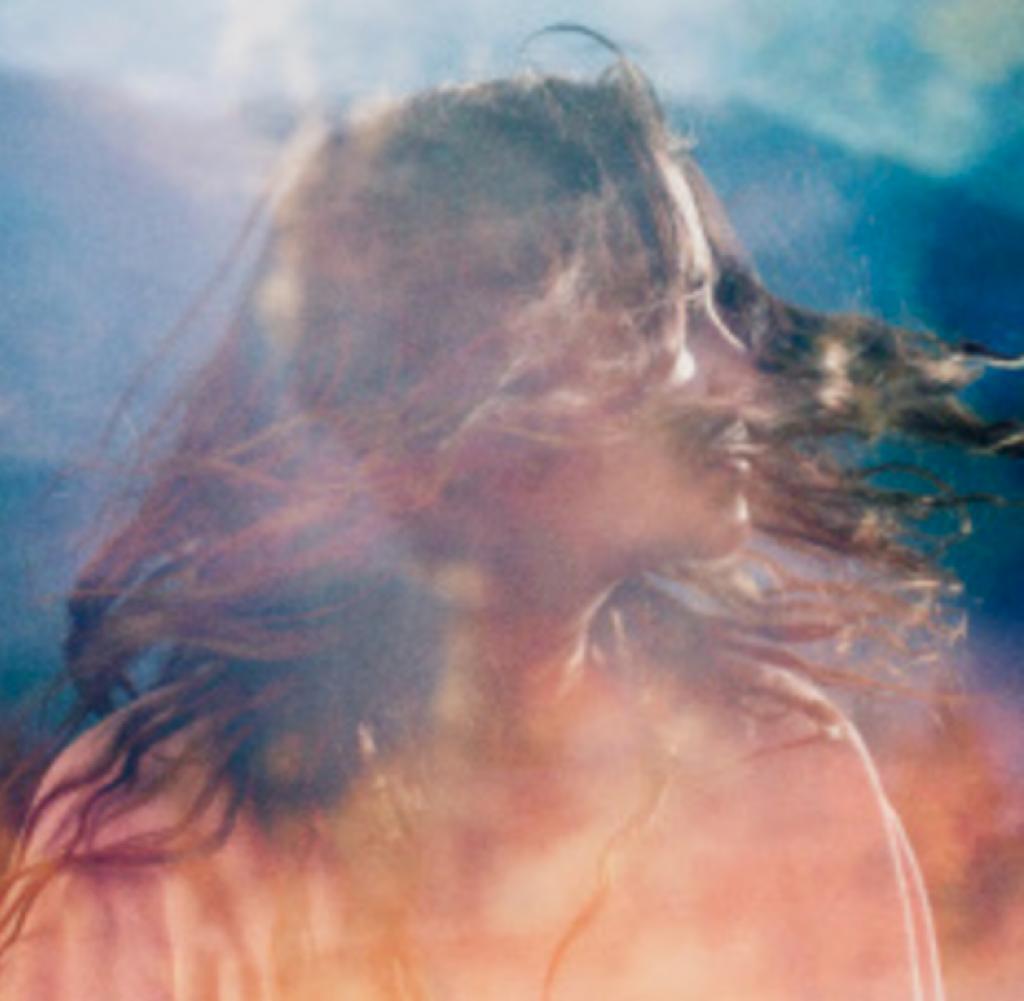Leona Naess Opens Up About Revitalizing Her Career
After a 17-year hiatus from making records, British-born singer-songwriter Leona Naess, recently released her highly anticipated fourth record, Brood X, produced by Max Cooke (Ellie Goulding/Winona Oak). Recorded in several countries including Italy, Switzerland and England, Brood X, despite its international landscape, comprises an intimate, personal and sweetly tuneful collection of synth-infused alternative-indie-pop songs. As per her oeuvre, Naess’s characteristically introspective lyrics take front and center as she contemplates motherhood, romance, and friendship, leaving no relational stone unturned.
One of the album’s highlights, the hypnotic “Name Across The Sky,” finds Naess, despite its upbeat tempo, desperately trying to mend a broken relationship with a loved one. “I wish that we could go back to before the fall,” she sings. “I always try to choose love over anger and I meet you halfway but you’re not moving at all.”
Naess burst onto the music scene in 2000 with her debut album Comatised whose lead single “Charm Attack” landed at No. 29 on Billboard’s Adult Top 40 chart and appeared in the film Whatever It Takes. A year later, she released I Tried To Rock You But You Only Roll, followed by her self-titled record in 2003. After her father’s untimely death in a mountain climbing accident in 2004, however, Naess stepped away from the music industry and met and fell in love with her now-husband with whom she has two children. Though she continued to write songs and recorded an album as she mourned her father, Naess didn’t release Thirteens until 2008, four years after it was recorded.
Naess deliberated making a new album several years ago but it wasn’t until last year that she finally felt comfortable making records again. “It was always lurking and circling in my mind but something finally opened up in me that was like, ‘OK, I’m ready to do this,’” says Naess over the phone from Connecticut, where she is vacationing away from New York City where she lives with her family.
Naess talked to SPIN about her new record, losing of both of her parents, and her difficult experiences in the music industry.

SPIN: Why did you choose Brood X to be your record’s title?
Leona Naess: I hadn’t made a record for 17 years and when I was trying to think of a name, I was reading the New York Times on my phone and I saw an article talking about the summer of 2021 and how the cicadas, Brood X, who stay underground for 17 years, were going to come out. I did the math and said, ‘That was 2004. Oh my God, that’s when I last recorded a record.’ So it felt like, of course, it had to be called Brood X. And I’m Generation X. There were so many connections…brooding…kids…broody…so it just felt like the title.
What distinguished making this record from your previous records?
It was the best experience making this record because I was the boss. I used to have a producer who was a lot older and had done it before and he’d be like, ‘Don’t worry. Go home. I got this.’ or ‘Trust me, blah blah blah.’ I never released something I didn’t like but there were times where I was like, ‘I’m not sure but that’s cool. It’s fine. I don’t want to fight about it.’ This time, I was older and I had confidence in myself. When something didn’t sound right, I said, ‘I’m not cool with this so we have to fix this’ and I wouldn’t give up until it was right, which is something I hadn’t done before, and maybe that’s because I relied on others or didn’t trust my judgment.
How did you come to work with producer Max Cooke?
I was in L.A. before COVID. I wanted to meet Rostam [Batmanglij] and to work with him but he was in the middle of making a Haim record and then I met Max and I thought, ‘Oh my God, he’s the one.’ It’s so weird to go into a room with someone you’ve never met and write a song. You’re baring your heart. But it was really easy and great. He is just such a good soul and he’s not too cool for school or judgmental. He’s excited. And he can play any instrument.
Originally, you didn’t plan on making your own record. You wanted to write songs for other artists, right?
Yes, I wanted to be able to do that because I have two small kids and I love writing music. In my head, I was like, ‘I’m not going to go on tours. I’m not going to go onstage. I don’t want that scrutiny or to put myself in that situation. I’m too old for that.’ I wanted to go out and be in the rooms with all the big singers and do all the topline because I feel like I’ve always been pretty good with lyrics and melodies so I went to my business manager and said, ‘How do I get this to happen?’ and he said, ‘Look, you can’t send your CD from 2004. That’s not how it works. You have to have current stuff so I said, ‘OK, I’ll just make a record.’And then I started and it was so much fun, and I had a lot going on so it wasn’t like I was just writing songs to write songs. They were in me and needed to come out.
Sadly, one of the things you were dealing with was your mom’s Alzheimer’s disease before she died during the pandemic. Tell me about “If A Song” which you wrote while she was still alive. It’s heartbreaking to hear you sing, “If a song could wake you up and bring you back and snap you out…I’d sing it…”
She got sick when my daughter was 1 so it was about 9 years ago. It was aggressive Alzheimer’s and I’d come and stay with her as much as possible, once a month if I could, because she was in London. Then it got to the point where she couldn’t talk or move. I think I even confused her when I’d come because when you have really bad Alzheimer’s you only recognize people you see every day, so the last time I saw her was in January while COVID was looming but hadn’t really hit. I went to London and met up with Max and did two songs. I had just been with my mother and I had the idea that if I wrote this song and sang it to her it would wake her up. My brother played it for her because I had to go back [to New York] but he said that she had, if you know someone well enough and you see their face every day, you know when there’s a change. She could barely open her eyes but there was a smirk or something. He said, ‘She totally knew that was you and that was for her.’ I don’t know if my brother is saying that to make me feel better because he looked after her but I believe it did do just that. Even if the song never came out, it served its purpose.

Wasn’t it your mom who bought your first guitar for you when you were 14 years old?
Yes, she did. She got me a Guild which is a beautiful guitar but it’s also a very hard guitar to play because the neck is very thick so I learned on a very difficult guitar. Usually, you get a small neck and the gauge is low and the strings aren’t heavy but my mom didn’t know anything about guitars, and my fingers would be bleeding. I’d just sit in my room and play and play and I didn’t put my guitar down for 10 years. While everyone else was out getting drunk, I was trying to learn how to play “Blackbird.”
It’s hard enough to lose a parent, let alone to lose your second parent. Your father died tragically in a mountain climbing accident which is shocking. It must have been especially devastating not to be able to say goodbye to him.
It sucked. I’ll never forget that moment. My mom died slowly but I wasn’t able to talk to her either because of her Alzheimer’s so I couldn’t really say, ‘Goodbye’ but I did have time. It’s crazy, the difference with each – the mourning of a very unexpected death to one that is long and drawn out. They’re both pretty harsh. I’m finally, now, dealing with my mom but when someone dies quickly like that it’s violent so the response is violent. You cry and you mourn and don’t get out of bed but you feel it. In some way, I would say the most important thing with anything that happens to you is you feel it and don’t suppress it because then it never moves.
You sing about embracing difficult emotions like fear in “Kisses Movies,” in which you sing about your brother Evan Ross from your dad’s 13 year marriage to Diana Ross. What was it like to have an icon like Diana Ross as a stepmother, especially as a singer/songwriter?
She was pretty instrumental in my life. I was very lucky to have had such a cool stepmother. I grew up in England and the British press are pretty evil so when I first started, I definitely had a chip on my shoulder about talking about anything like that because I was scared that it would be, ‘This is why she has this opportunity…because Diana Ross is her stepmother.’ I would always brush over any question about her. Now, I am like, ‘Why did I do that?’ It was a fact, a pretty awesome fact, and she really helped me. She told me I was great. When I was 15 or 16, she let me teach one of my songs to her band when she was playing at Wembley [Stadium]. I got to sing it for her whole audience. Of course, her audience was so generous because they adore her so when she says, ‘This is my daughter who wrote a song…’ the whole place was like, ‘Raaah!!!’ It was pretty amazing. I have a tape of it somewhere.
What an incredible experience. So you were writing songs in your teens and then you moved from London to New York where you studied anthropology at NYU. When did you fully commit to music?
I moved to New York and was going to go to the music department but I didn’t believe that learning how to write music was healthy. I thought it would get in my way so I went to Gallatin [School of Individualized Study], a more relaxed department where you could do your own thing. I started playing shows. I booked gigs. I worked at Nell’s as a coat check and would make pretty good money and with that money I got a band and played every gig I could get. I played The Bitter End, Fez, Continental Bar, Brownies…all the places. A lot of them are gone now. I was terrible. Thank God no one videoed me. I had a blind, oblivious belief in myself and then a few people from Epic Records came to one show and when one person of power is into you then five other labels show up and so it worked out that as soon as I graduated, after that summer, I signed my record deal, made my record and it came out in 2000. I was lucky. It was fast. I was like 24 when it came out, which is probably old now. [Laughs.]
I read in one of your interviews that you initially loved being signed to record labels but that you didn’t feel as good about it as time went on.
I signed to Outpost, which was a really cool label out of L.A. I was going to sign to Epic but I felt like I would have very little control with such a huge label like that. The small label was awesome and the three people who started it were legends in the music world so I was like, ‘I want to be with these guys because they understand music.’ They were great but as soon as I got signed, Outpost was bought by Interscope and all their acts got sent to different parts of Universal so I no longer had the label that I made my record with. As soon as my record was done, I was handed to another label with a whole bunch of people who didn’t know who I was and I had to get them on my team very quickly before the record came out. So with label stuff, I was lucky in some ways but there was always something that happened. My second record came out the week after 9/11. By my third record, my label was dissolved. It’s very hard. There are always things that happen and timing – and if people aren’t for you on the label it’s very hard for things to move. It’s not that I don’t trust record labels but unless you are a very powerful artist or have huge buzz going, there’s really not a lot that they do.
But there was also a part of me that was self-sabotaging to some degree. I have to take responsibility. I loved making the music, I loved writing and being in the studio and I loved playing live but the other stuff…the promotion…the meets and greets… it was hard for me. I feel like I sabotaged a lot of opportunities that I should have taken advantage of. I didn’t go for dinner with the radio people after shows. I went and hung out with my friends. When we started, it was very uncool to play the game. You did not hang out and chat to press people or fans. You were this ghost. You just did your show and disappeared and it was a mystery and I loved that. All the artists I looked up to…you weren’t sure what was going on. Now, it’s a different time and you have to basically video what you’re eating for breakfast and what you’re doing for lunch and post it. I also don’t think I was a 100% behind every record I made because people interfered and I probably would have taken a few songs off that were on there that I wasn’t 100% keen about. I was just young and insecure and not as sure as I am now.

And you released several records fairly close together so you were forced to try to figure things out quickly as you went along, which can be hard when you don’t have much experience.
I always thought it was just about the music. I didn’t realize until I read a lot of biographies that you could actually be a real artist and also care about your looks. David Bowie, The Stones, The Beatles…They all thought about the whole picture. It’s not just about the music. It’s a whole culture. I think in my mind I felt that was not a true artist – that a true artist was just about the music and they didn’t think about the look.
That’s interesting. I am curious if, as a woman, you also didn’t want to be seen as trying to capitalize on your looks.
Yeah, yeah. Definitely. I remember doing [The Late Show With] David Letterman and my dad came to be with me and he was like, ‘Are you wearing that?’ I was wearing jeans and a t-shirt and he was like, Are you kidding me?’ And I said, ‘Yeah, I’m comfortable and he said, ‘You’re doing one of the most important shows and you’re dressed like you dress every day.’ And I said, ‘I don’t want it to be about anything other than music’ but my dad was right because it was a huge opportunity. It’s not like I had to wear sparkles but I could have made more of an effort. It was a rebellion, I think. I had a thing of, ‘Nope, I’m not going to do that.’
It must be exciting and rewarding but potentially scary to release your first new record in 14 years. How do you feel?
At first, I just wanted it to come out. Now, I hope people hear it, that people love it and that it becomes their favorite record. I also kind of feel like it’s already served its purpose which is that I was able to make music and write songs and get these feelings out of me and express myself. And I’m proud of myself. I think it’s an awesome record and it doesn’t sound like anything else. It’s not trendy sounding. There seems to be a lot of music that sounds very similar to me right now and maybe that could work against me but it’s very honest and It sounds like me.
The post Leona Naess Opens Up About Revitalizing Her Career appeared first on SPIN.
